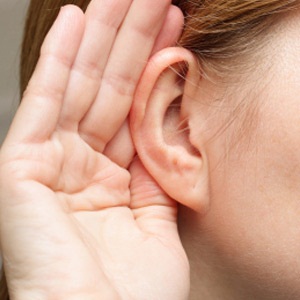Older adults with impaired hearing may have a faster rate of brain shrinkage as they age, a new study suggests.
A number of studies have found that older people with hearing loss tend
to have a quicker decline in their memory and thinking skills, compared
to those with normal hearing.
"We've known that common, age-related hearing loss is associated with
cognitive [mental] decline. The question is, why?" said Dr. Frank Lin,
an assistant professor at Johns Hopkins University in Baltimore, and the
lead researcher on the new study.
The findings, he said, offer one potential explanation: Older adults
with hearing problems lose brain volume more quickly than their peers
with normal hearing.
The precise reason is not clear, and the real-life impact is unknown.
The study did not test participants' actual mental ability.
But the "biggest question," Lin said, is whether treating hearing
impairment can slow changes in brain structure and, more importantly,
delay dementia.
He and his colleagues are now planning a trial to test that idea.
The current findings are based on 126 adults aged 56 to 86 who underwent
yearly MRI scans to track brain-tissue changes for up to a decade. At
the time of the first scan, they also had a physical and a hearing test.
Of participants, 51 showed some degree of hearing loss -- mostly the
mild variety where people have trouble hearing soft voices, for
instance.
Lin's team found that older adults with hearing problems showed a faster
decline in brain volume over the years -- especially in brain regions
involved in processing sound and speech.
The study, published online Jan. 9 in the journal
NeuroImage,
cannot prove that hearing loss directly causes brain-tissue loss. But
the basic "use it or lose it" principle may apply, according to Lin.
"The ear is no longer sending clear messages to the brain," he said.
Without that input, sound-processing brain regions may change in
structure.
What's more, Lin said, those brain areas have other jobs, too. Among
other things, they play a role in memory and processing information
other than sounds.
A hearing expert not involved in the study said it's "interesting," and
raises the question of whether treating hearing impairment can prevent
brain-tissue loss or slow mental decline.
"But we need a study to test that, and that study has yet to be done,"
said Dr. Ian Storper, an otologist at Lenox Hill Hospital, in New York
City.
Even though researchers have found a link between hearing loss and
mental decline, Storper noted, "that doesn't prove causation." Both
hearing loss and brain-volume loss are common parts of aging, and there
are many other variables that may be related to both, Storper added.
Lin's team did account for some other health factors -- like whether
people smoked, or had high blood pressure or diabetes. And there was
still a connection between impaired hearing and greater brain-volume
loss.
But Lin agreed that what's ultimately needed is a trial testing whether hearing loss treatment slows mental decline.
"In the end," Lin said, "what everyone cares about is, what can we do about it?"
There are, of course, already reasons to treat hearing loss, Storper
said. In some cases, treatment can be as easy as removing impacted ear
wax, he noted.
But often, older adults need a hearing aid or assistive devices that
make it easier to hear in specific situations -- while talking on the
phone or watching TV, for example.
According to the U.S. National Institute on Aging, almost one-third of
Americans aged 65 to 74 have at least mild hearing loss -- as do nearly
half of those aged 75 and older.
If impaired hearing is one contributor to mental decline and dementia,
Lin said, then treating it could have a big impact on public health.
Read more from:
http://health.usnews.com/health-news/news/articles/2014/01/28/hearing-loss-tied-to-faster-brain-shrinkage-with-age








